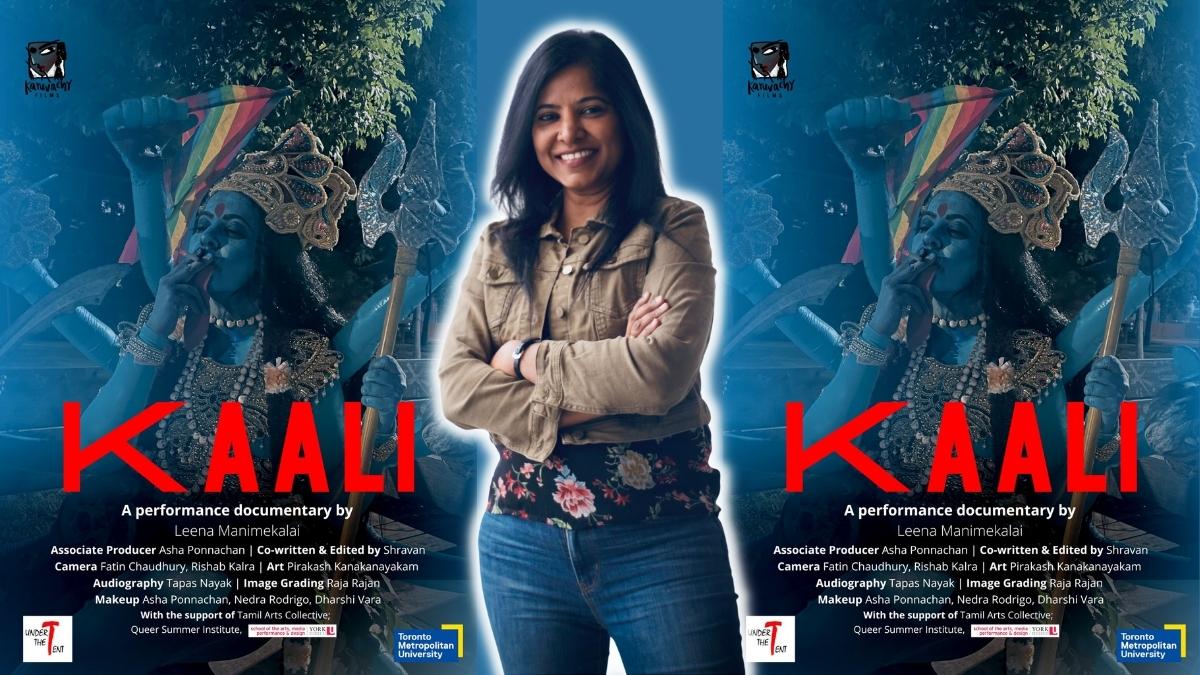Leena Manimekalai’s Kaali stirs ‘right to free speech’ debate

Kaali was first screened during Rhythms of Canada, a week-long festival celebrating multiculturalism, at the Aga Khan Museum in Toronto
Leena Manimekalai, an independent filmmaker, attracted criticism online days after tweeting the cover image for her most recent documentary Kaali.
The image shared last Saturday depicts a lady wearing a Goddess Kaali costume smoking a cigarette while carrying a pride flag, which stands for the LGBT community.
Kaali was originally shown at the Aga Khan Museum in Toronto last weekend during Rhythms of Canada, a week-long celebration honouring multiculturalism.
The film’s plot, according to the filmmaker, centres on the events that happen one evening when Kaali arrives and wanders the streets of Toronto.
Online backlash over the Kaali poster led to calls for her imprisonment and accusations that she had offended religious feelings. The hashtag "#ArrestLeenaManimekalai" quickly became a trending hashtag on Twitter.
‘If speaking without fear costs my life, I will give it’
The Canadian-born Manimekalai advised her followers on Twitter to use the hashtag "#LoveYouLeenaManimekalai" rather than "#ArrestLeenaManimekalai" on Monday in response to the outcry on social media.
“No harm can come to me. Until it is, I want to be with a voice that speaks without hesitation. I will lose my life if that is the price,” she said in a tweet made in Tamil.
Manimekalai, who is from the village of Maharajapuram in Virudhunagar, Tamil Nadu, has worked on critically praised films including Madathi and Sengadal: The Dead Sea.
Police complaint filed over the controversial poster
In the meantime, a Delhi-based lawyer on Monday reported Manimekalai to the police over her contentious documentary poster.
According to the complainant lawyer, Mr Vineet Jindal, the Director has offended his religious emotions by presenting Goddess Kaali as smoking. He described it as exceedingly offensive and not acceptable in any way.
Mr Jindal demanded that a formal complaint be filed against the independent filmmaker immediately, claiming that the depiction of the Hindu Goddess in such a despicable way is hurtful to the beliefs and feelings of the Hindu community.
Films and controversies co-occur regularly
Several movies and television shows have already faced criticism for purportedly hurting religious emotions.
For instance, Twitterati criticised Anurag Basu's "Ludo" for allegedly pushing ‘Hinduphobic’ ideas in the film. The online series "Taandav," starring Saif Ali Khan, sparked controversy in 2021 for reportedly inciting religious conflict by disparaging Hindu deities.
Right to free speech in the present times
The definitions of free speech and hate speech are hotly contested, despite the fact that the Indian Constitution expressly guarantees the right to free speech (which also includes creative expression).
Many people found the image to be unsettling, particularly in light of the nation's unstable political environment and the ongoing communal conflicts.
In the last couple of months alone, an objectionable statement by BJP spokesperson Nupur Sharma during a TV debate led to nationwide protests and clashes between Hindus and Muslims, followed by massive blowback by nations. Unfortunately, this resulted in the gruesome and terrifying murder of Kanhaiya Lal in Rajasthan’s Udaipur.
https://twitter.com/LeenaManimekali/status/1541838105380114434
Directors and filmmakers must use discretion when depicting religious figures, regardless of faith, in a way that can offend a community given the tumultuous character of the current period, during which there have been significant protests in all Indian cities.
India’s CBFC is comparatively stricter
The Cinematograph Act of 1952 established a strict process for approving films for public consumption - commercial films shown in movie theatres and other public viewings - even if the producers fail to show proper regard for the religious views of people. Additionally, it is accountable for the existence of the Central Board of Film Certification (CBFC).
In comparison to certification bodies from its time, the CBFC operates with far greater rigour. In addition to categorising movies, it also recommends edits and deletions to the media's content in accordance with regulations set forth by the government.
In contrast, the British Board of Film Classification's officers only examine and categorise movies according to the recommended age bracket or suggest changing the age group that the movie's creator had originally designated. Similar to this, parents in the United States select whether films are suitable for children to watch through the Classification and Rating Administration (CARA).
India needs to uphold civil liberties
However, according to a number of international rankings, the country's civil freedoms are indeed deteriorating. India had a Civil Liberties Rating of 33/60 in the Freedom in the World report published by Freedom House in 2021. The country was placed 142nd out of 180 nations that year in the World Press Freedom Index, down from its 2017 level of 133rd.
Given the dwindling state of civil liberties in the country, a lot of work needs to be done not only to improve the country’s ranking in such international rankings but also to change the perception of the people of the Western countries towards the nation. Obviously, the people living in India should enjoy civil liberties including religious freedom at par with developed countries like the United States.
https://www.digpu.com/india-news/leena-manimekalais-kaali-stirs-right-to-free-speech-debate
Comments
Post a Comment